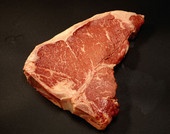
SUNDAY, April 7 (HealthDay News) — A compound found in red meat and added as a supplement to popular energy drinks promotes hardening and clogging of the arteries, otherwise known as atherosclerosis, a new study suggests.
Researchers say that bacteria in the digestive tract convert the compound, called carnitine, into trimethylamine-N-oxide (TMAO). Previous research by the same team of Cleveland Clinic investigators found that TMAO promotes atherosclerosis in people.
And there was an another twist: The study also found that a diet high in carnitine encourages the growth of the bacteria that metabolize the compound, leading to even higher TMAO production.
“The [type of] bacteria living in our digestive tracts are dictated by our long-term dietary patterns. A diet high in carnitine actually shifts our gut microbe composition to those that like carnitine, making meat eaters even more susceptible to forming TMAO and its artery-clogging effects,” study leader Dr. Stanley Hazen, head of preventive cardiology and rehabilitation in Cleveland Clinic’s Heart and Vascular Institute, said in a clinic news release.
Hazen’s team looked at nearly 2,600 patients undergoing heart evaluations. The researchers found that consistently high carnitine levels were associated with a raised risk of heart disease, heart attack, stroke and heart-related death.
They also found that TMAO levels were much lower among vegetarians and vegans than among people with unrestricted diets (omnivores). Vegetarians do not eat meat while vegans do not eat any animal products, including eggs and dairy.
Even after consuming a large amount of carnitine, vegans and vegetarians did not produce significant levels of TMAO, while omnivores did, according to the study in the current issue of the journal Nature Medicine.
Although the new study could not prove any cause-and-effect relationship between carnitine and heart damage, the findings may provide a new understanding of the benefits of vegan and vegetarian diets, the researchers said.
“Vegans and vegetarians have a significantly reduced capacity to synthesize TMAO from carnitine, which may explain the cardiovascular health benefits of these diets,” said Hazen, who is also vice chair of translational research for the clinic’s Lerner Research Institute.
Two heart disease experts said the study yields up important new insights.
According to Dr. Robert Rosenson, it appears that poor eating habits could raise TMAO levels and “increase the ability of the cholesterol to get into our arteries and interfere with the ability of our body to eliminate that excess cholesterol.” Rosenson, director of cardiometabolic disorders at the Icahn School of Medicine at Mount Sinai, in New York City, said the study “sheds important new information on the association between diet, atherosclerosis and cardiovascular events.”
Another expert pointed the finger specifically at red meat and energy drinks.
“Most Americans have heard the famous saying ‘you are what you eat,'” said Dr. Tara Narula, associate director of the Cardiac Care Unit at Lenox Hill Hospital, New York City. “This phrase may be more true and different than we might have imagined.”
The new study “brings awareness that many ‘supplements’ like energy drinks can have the same [vessel-damaging] compounds as red meat,” she said. “Energy drinks may not be harmless and can have unseen side effects that consumers should recognize.”
As for beef, pork and the like, Narula said that the “real take-away message is the reinforcement of the current recommendations that a heart-healthy diet should have little to no red meat consumption.”
More information
The U.S. National Institutes of Health outlines how you can reduce your heart risks.

